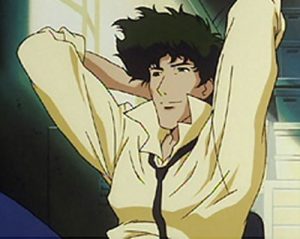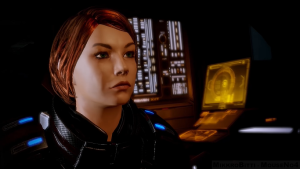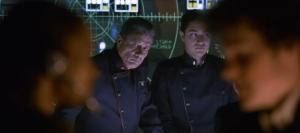Hawkeye Pierce
Hawkeye is permanently locked in my head as to what a cool person is like. Obviously, there’s the jokes; not just the infinite well of them, nor even the infinite styles of humour he plays with (as broad as imitation and reference, as dry as wordplay and irony), but his total commitment to every single joke he tells. The more ironic Hawkeye’s actions, the more sincere his expression. If he feigns horror or hurt or naiveté, he doesn’t overplay them – it’s a slight dropping of the voice, a slight widening of the eyes, a slight arching of the back. The only thing that gives the game away is a knowing twinkle in his eyes. The ironic thing about the sheer volume of jokes he tells is that each one feels special because it feels like you’re in on it with him – being able to see that he’s kidding means you’re as smart as he is. That’s the other part of his comedic commitment; there are few situations so terrible that he can’t tell a joke. But there’s also his deep capacity for love. I want to love someone as passionately and sincerely as he loves Adam’s Ribs, let alone the ‘finest kind’ he seeks out. Life is a thing to be enjoyed – to extract every possible iota of happiness out of, no matter the situation. Hawkeye shows how to do that better than anyone: love unconditionally.
Spike Spiegel
I love Spike’s playfulness. What he chooses to commit to often strikes the people around him as strange and arbitrary; in the first episode, he decides not to chase the bounty at first because he gets no joy out of the idea, and it’s only after hearing Asimov’s girlfriend describe their plans that he changes his mind. We see that her dreams offend him – and we see him hide that from her – but we don’t get to know exactly why. In one episode, Spike chases Vicious despite Jet quite reasonably pointing out that it’s obviously some kind of trap; in another, he opts out of a very easy and lucrative job because ‘hackers are boring and chasing them’s more boring’. I understand Spike as chasing the extraordinarily esoteric goal of soulfulness – things that replenish him emotionally, matters of honour and humanity. I admire his complete indifference to other people’s opinions of his desires; when he first meets Faye, she derisively refers to him as a gadjow, which he immediately appropriates as a badge of honour, and he generally lets insults wash over him. He’s going in one direction and he doesn’t care if the world is going in another.
What I especially like is that he extends this out to other people as compassion. Libertarianism is generally associated these days with pedophile wannabe technocrats who desperately wish they could fuck over everyone else and plant themselves as king of the dungheap, but I’ve always been attracted to the left-leaning anti-authoritarian libertarianism that takes joy in the different ways humanity can express itself and has no wish to rule. I believe the one way in which I am not an eccentric is that I would prefer to be left alone to my own weird little interests with minimum oversight or interference, and I deeply enjoy seeing people do their own weird shit that would never occur to me. I think Spike reflects this; he has a live-and-let-live do-not-lead-and-do-not-follow sensibility I deeply admire. He strikes up multiple friendships with middle-aged women that remind me of my own friendships with people from that demographic, who are pleased to be admired on their own terms and for their own abilities and return the favour. It’s he, surprisingly, who tells Faye with delight that they are the fairy godparents of a goofy teenager (delight, of course, coming from this giving him license to shoot someone). It’s he who tells Faye that her past might be a mystery, but she still has a future she can carve out.
Ronnie Gardocki
Nuff said!
Commander Shepard (Paragon)
I like that she’s nice to people – not in any performative or mechanistic way, but in that she legitimately likes and is charmed by the people she meets. Jennifer Hale’s performance is a big part of this; soulful, lively, and as single-minded as the character. She believes in the best in people and will point directly at it when she sees it. Paragon Shep is practically the personification of service to humanity (or sentience, I suppose), not just willing but eager to help others achieve their goals. She makes it look and feel so effortless; if you choose a tragic backstory for her, she dismisses it in a few lines as something she worked through and left in the past, and there’s a sense of Shep as having reached such clear-eyed inner peace that she doesn’t need to suck up pleasure or dominance or esteem or what have you. You can’t threaten her because you have nothing she wants. She’s nice to people, not because she thinks it makes her a good person or because she’s trying to manipulate people – well, a little bit those things, but mainly but because they inherently deserve it as fellow sentient beings. She’s nice to people because her identity doesn’t depend on being better than anyone.
Commander Adama
Much like Hawkeye, what I admire most about Adama is his capacity for love – it’s just it’s particularly surprising to find it here. Adama is a deeply intelligent and competent man in a story that prioritises these qualities; the point of Battlestar Galactica is that these are largely weak people doing their best in a desperate situation, and Adama seems to act as an anchor in his quiet professionalism. But that professionalism is an extension of his love; he’s shown to be that classic Father To His Men officer, but it’s played with total and firm commitment above and beyond any other example I’ve seen. He is genuinely loving towards and proud of the people who serve under him; his very first scene has multiple people walk up to him and say it’s been an honour serving with him, and every single time he says the honour was his, and every single time he means it. He genuinely sees himself as serving them. He is overjoyed at their successes, saddened by their defeats, believes wholeheartedly in their ability to kick ass. There are very few sentimentalists I admire and Adama is one of them. He is fueled by an unshakeable, sincere, and clear-eyed love.
I also admire his complete lack of pride in his competence. At no point does he ever convey any sense that he thinks he’s the smartest, most moral man in the room; there are multiple scenes within the pilot miniseries alone in which he’s talked out of or into a plan of action, as opposed to being an authoritarian whose ideas are correct by virtue of him having them. It isn’t just that whatever will achieve the goal will achieve the goal, it’s that he can be convinced the goal itself is not worth pursuing. I’m particularly struck by his conversation with Roslin in the miniseries, in which she convinces him away from pursuing revenge on the Cylons for destroying humanity – she presents the facts and later, we see him hearing out the different options for how to proceed from his officers. We see him watching one of his bridge crew flirting with Roslin’s assistant, obviously contemplating what she said, and then deciding that humanity shamed and alive is preferable to proudly dead. It doesn’t come off as weak or indecisive; it comes off as swapping out one decision for another. It’s a different kind of strength of character.





